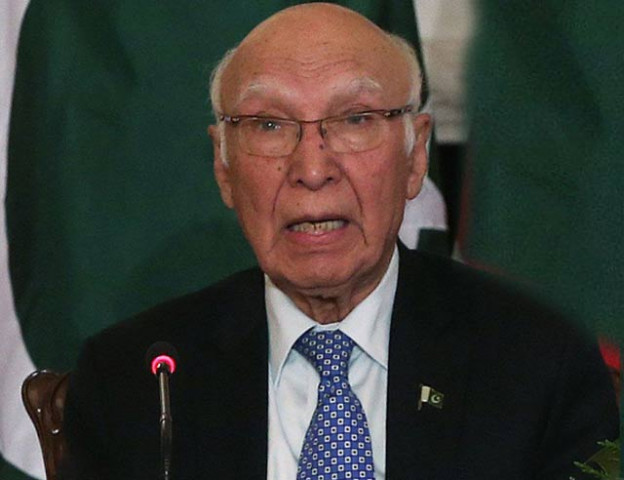Sartaj Aziz opposes preconditions for Afghan peace talks
Adviser to PM on Foreign Affairs kicks off four-nation meeting with four guiding points

A file photo of Adviser to the Prime Minister on Foreign Affairs Sartaj Aziz. PHOTO: AFP
"It is important that no preconditions are attached to the reconciliation process, as it will create difficulties in bringing Taliban to the negotiating table," Aziz said, as he penned down four elements essential in the reconciliation process with Afghanistan.
Top officials from Pakistan, Afghanistan, China and the United States are meeting in Islamabad today to finalise a roadmap for resurrecting a stalled peace process in Afghanistan.
 In this handout photograph released by the Associated Press of Pakistan (APP) on January 11, 2016, Pakistan's National Security Advisor Sartaj Aziz (C) chairs the first ever round of four-way peace talks meeting with Afghanistan, US and Chinese delegates in Islamabad. PHOTO: AFP
In this handout photograph released by the Associated Press of Pakistan (APP) on January 11, 2016, Pakistan's National Security Advisor Sartaj Aziz (C) chairs the first ever round of four-way peace talks meeting with Afghanistan, US and Chinese delegates in Islamabad. PHOTO: AFPThe talks in Islamabad, announced in December, come as the Taliban's insurgency intensifies particularly in the country's south, testing the capacity of Afghanistan's overstretched military and placing pressure on Pakistan to rein in its one-time proxies.
Some analysts hope the added presence of China and the United States may help overcome mistrust between Kabul and Islamabad, though it remains unclear when the Taliban themselves will return to the negotiating table. They are not part of this week's talks.
Quadrilateral meeting: Islamabad to identify ‘reconcilable’ Afghan Taliban
"The primary objective of the reconciliation process is to create conditions to bring the Taliban groups to the negotiation table and offer them incentives that can persuade them to move away from using violence," said Aziz, as he opened the talks.
Inaugurating the first meeting of the Quadrilateral Coordination Committee on Afghan peace process, where attendees included Afghan Deputy Foreign Minister Khalil Hekmat Karzai and the special representatives of the United States and China for Afghanistan, Aziz said Pakistan gives importance to its neighbours and wants peace in Afghanistan.
"The primary objective of the reconciliation process is to create conditions to bring Taliban to the negotiating table and offer them incentives that can persuade them to move away from using violence as a tool for pursuing political goals," he said.
Taliban toughen stance on peace talks ahead of quadrilateral meeting
"It is therefore important that no preconditions are attached to the reconciliation process," Aziz added.
"Proper sequencing is required in the negotiating process," he said while adding that "threat of use of military action against the group will cause hindrances and cannot proceed the offer of talks to all groups."
"Distinction between reconcilable and irreconcilable rules and how to deal with the irreconcilable can follow once all avenues of bringing them to the table have been exhausted," Aziz said.
The premier's senior aide added, "Certain confidence building measures can play a key role in encouraging Taliban to join the negotiating process."
Expressing confidence that the meeting will evolve as an efficient, procedural framework to provide the basis for smooth functioning of the group, the adviser said the course of action should be realistic and flexible. "Unrealistic targets and deadlines must be avoided."
Countries to negotiate for Afghan peace process in mid-January
"Keeping in mind the group's sensitive nature of work and acknowledging the importance of positive public messaging, Pakistan should keep Taliban away from media as much as possible," Aziz said.
Pakistan had brokered a rare face-to-face meeting between Afghan officials and Taliban representatives in July last year, The initiative, officially called Murree Peace Process, however, fell apart after news emerged that Taliban’s long-time leader Mullah Omar had died two years ago.
However, after China and the US encouraged both Islamabad and Kabul, the two sides agreed to pursue the reconciliation process. Army chief General Raheel Sharif then traveled to Kabul as part of efforts to expedite the peace process.
A senior Taliban source from Mansour's faction told AFP that Pakistan had been in touch with Taliban leaders, but the group was waiting to see whether their rivals from Rasool's faction were also likely to attend future talks.
"As far as I know, the Taliban leadership is willing to attend any such meeting in future but we will also see which other Afghan group or a Taliban splinter group will be invited for these proposed peace talks," he said.
Rahimullah Yousufzai, an expert on the group, termed the talks an "important development", adding the presence of the US and China provided extra weight.
Pakistan-backed Afghan peace talks may restart within weeks
But he cautioned: "The Taliban have not yet showed their willingness to talk. They said their first priority is to end their differences. In my opinion the splinter Rasool group will come but the presence of Mansour's group is very important, so let us wait to see how they react."
But despite the internal rifts and the onset of winter, when the Taliban traditionally break off fighting, the insurgents are still staging brazen attacks.
In September they briefly seized the northern provincial capital of Kunduz - the first time they had gained control of a city since the fall of their regime in 2001.
And in recent weeks they have seized large swathes of the key opium-rich district of Sangin in the southern province of Helmand, their traditional stronghold.
Observers say the intensifying fighting highlights a push by the militants to gain greater concessions during any future direct talks.



















COMMENTS
Comments are moderated and generally will be posted if they are on-topic and not abusive.
For more information, please see our Comments FAQ